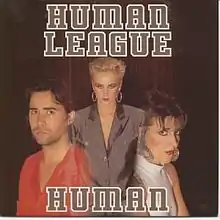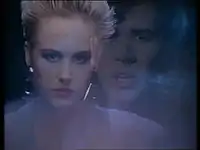Human (The Human League song)
"Human" is a song recorded by British synth-pop band The Human League, and released as the first single from their 1986 album Crash. The track, which deals with the subject of infidelity, was written and produced by Jimmy Jam and Terry Lewis.[4] The song topped the charts of the United States, becoming the second single by the band to top the Billboard Hot 100 after 1981 single "Don't You Want Me".[5] It also went to number one in Canada while reaching number five in Germany and number eight in the band's native United Kingdom.
| "Human" | ||||
|---|---|---|---|---|
 | ||||
| Single by The Human League | ||||
| from the album Crash | ||||
| B-side | "Human" (extended instrumental version) | |||
| Released | 11 August 1986[1] | |||
| Recorded | February 1986 | |||
| Studio | Flyte Time Studios (Minneapolis) | |||
| Genre | ||||
| Length |
| |||
| Label | A&M, Virgin | |||
| Songwriter(s) |
| |||
| Producer(s) | Jimmy Jam and Terry Lewis | |||
| The Human League singles chronology | ||||
| ||||
Background and composition
In 1985, the recording sessions for the Human League's fifth album were not going well, and the band did not like the results, which was causing internal conflict. Virgin Records executives, worried by the lack of progress from their at-the-time most profitable signing, suggested the band accept an offer to work with producers Jimmy Jam and Terry Lewis, who already had material to work with; and had expressed an interest in the band from their U.S. releases. Jam and Lewis had recently emerged as in-demand talent due to their success with Janet Jackson and her Control album.
Of the ten songs on Crash, Jam and Lewis wrote three, "Human" being one of them. It is a mid-tempo ballad which lyrically is an exchange between a man and a woman in a relationship who have reunited after a separation. In the first two verses Philip Oakey is apologising to his partner for being unfaithful during her absence, and in the song's breakdown Joanne Catherall's spoken-word confession reveals that she too was unfaithful. The song's title is derived from the chorus, in which both parties in the relationship explain that they are "only human" and "born to make mistakes". The song is a composition in common time with a tempo of 102 beats per minute. It is set in a key of A♭ major, with a chord progression from D♭-E♭-f.
"Human" became the second million-selling and final number-one single for The Human League on the U.S. Billboard Hot 100 (after "Don't You Want Me") and their second chart-topper on the U.S. Hot Dance Club Play chart (after "(Keep Feeling) Fascination"). Jam and Lewis' R&B-based production was also popular on American urban radio, bringing the Human League into the top ten of the U.S. R&B chart for the first time. The song also reached number one in Canada, giving the band their second and last number one there as well. In the United Kingdom, "Human" peaked at number eight in the UK singles chart.
Critical reception
On its release, "Human" was met with mixed reviews. In Smash Hits, reviewer Simon Mills described it as a "perfect pop record" which was however let down by Oakey's vocals, writing "The vocals on this single sound, as on all League records, fragile and unconfident".[6] Billboard wrote: "Trio that helped define British techno-pop has lost its do-it-yourself edge but gained Jam and Lewis; resulting dance ballad is lush, plush, even soulful."[2] However, John Leland of Spin criticised the record, saying: "The Human League tackle the schmaltzy pop soul ballad and emerge with no idea how silly they look." He added: "'Human', a whiny claim to sensitivity, undercuts the band's essential irony; the joke about Human League was that they weren't human but digital chips. And besides, this embarrassing confession is an unbearably weak defense of infidelity."[3]
"Human" has had some positive retrospective reviews, with AllMusic journalist Dave Thompson describing it as a "lovely romantic ballad. The lyrics make much of human mistakes and the need for human forgiveness in a thoroughly romantic context."[7]
Remixes
The song was revived and remixed by U.S. producers Joel Dickinson and John Michael in 2010. This new club remix incorporated elements from Coldplay's hit, "Viva la Vida." It was a favourite among NYC DJs including Junior Vasquez.
Chinese Whispers mix
"Human" was reworked and re-released in 2003 as a remix in the form of "The Chinese Whispers Mix", principally in Asia. It was the creation of Hong Kong based British producer Ian Widgery who had recently had major success in the Asian music market with the album Shanghai Lounge Divas. Widgery took the original, mixed in traditional Chinese instruments and recorded a new chorus in Mandarin by female Chinese vocalist Li Ya, which is interwoven with Oakey, Catherall and Sulley's vocals. Oakey's lead vocals are faded to give the music greater impact.
The remix was so popular that it crossed over to the UK and U.S. markets where it received radio airplay and play on music television stations during the height of the electroclash revival. Although it was not released as a single in either country it appears on some versions of the band's The Very Best of the Human League album of 2003.[8]
Music video

The music video for "Human" (which uses the shorter single version) was filmed in London during June 1986, in a studio using Chroma key overlay. It is heavily stylised to give a "water reflective" effect and blue hue throughout. In the first time that the band had been presented as a "Phil and the girls" trio, images of Oakey, Catherall and Sulley are constantly layered and blended. The video was conceived and directed by Andy Morahan.
In 2003, a new video was created and released to promote the Chinese Whispers mix. This music video used the original footage of Oakey, Sulley and Catherall from 1986 and interlaced it with traditional Chinese imagery of silhouetted water grass, water lilies and Chinese characters. It was subject of a U.S. MTV featurette which was introduced by Oakey and featured Ian Widgery talking about the creative process in the reworking of the original Human.
Charts
Weekly charts
|
Year-end charts
|
Parodies
- A parody of the song was performed by Gloria Estefan on The Rosie O'Donnell Show in 1998, under the title Cuban.[34]
References
- "Human". Discogs.com.
- "Reviews". Billboard. 98 (36): 81. 6 September 1986. Retrieved 30 March 2019.
- Leland, John (6 December 1987). "Singles". Spin. 2 (9): 47. Retrieved 30 March 2019.
- Pareles, Jon (8 February 1987). "The Human League plays the Ritz". The New York Times. Retrieved 24 July 2015.
- "Chart History - Hot 100". Billboard.com. Retrieved 26 March 2019.
- Mills, Simon (13 August 1986). "Album Reviews (Japan – 'Tin Drum')". Smash Hits. 8 (17): 73.
- Thompson, Dave. "Song Review - Human". AllMusic. Retrieved 23 June 2013.
- Discogs: Ian Widgery
- Kent, David (1993). Australian Chart Book 1970–1992 (illustrated ed.). St Ives, N.S.W.: Australian Chart Book. p. 143. ISBN 0-646-11917-6.
- "Ultratop.be – The Human League – Human" (in Dutch). Ultratop 50. Retrieved 27 February 2020.
- "Top RPM Singles: Issue 0856." RPM. Library and Archives Canada. Retrieved 27 February 2020.
- "Top RPM Adult Contemporary: Issue 8822." RPM. Library and Archives Canada. Retrieved 27 February 2020.
- "European Hot 100 Singles" (PDF). Music & Media. Vol. 3 no. 38. 27 September 1986. p. 12. OCLC 29800226 – via World Radio History.
- Pennanen, Timo (2006). Sisältää hitin – levyt ja esittäjät Suomen musiikkilistoilla vuodesta 1972 (in Finnish) (1st ed.). Helsinki: Kustannusosakeyhtiö Otava. ISBN 978-951-1-21053-5.
- "The Irish Charts – Search Results – Human". Irish Singles Chart. Retrieved 27 February 2020.
- "Nederlandse Top 40 – Human League The" (in Dutch). Dutch Top 40. Retrieved 27 February 2020.
- "Dutchcharts.nl – The Human League – Human" (in Dutch). Single Top 100. Retrieved 27 February 2020.
- "Charts.nz – The Human League – Human". Top 40 Singles. Retrieved 27 February 2020.
- "Swisscharts.com – The Human League – Human". Swiss Singles Chart. Retrieved 27 February 2020.
- "Human League: Artist Chart History". Official Charts Company. Retrieved 27 February 2020.
- "The Human League Chart History (Hot 100)". Billboard. Retrieved 27 February 2020.
- "The Human League Chart History (Adult Contemporary)". Billboard. Retrieved 27 February 2020.
- "The Human League Chart History (Dance Club Songs)". Billboard. Retrieved 27 February 2020.
- "The Human League Chart History (Hot R&B/Hip-Hop Songs)". Billboard. Retrieved 27 February 2020.
- "Cash Box Top 100 Singles – Week ending 29 November 1986". Cash Box. Retrieved 27 February 2020.
- "Offiziellecharts.de – The Human League – Human". GfK Entertainment Charts. Retrieved 27 February 2020.
- "Jaaroverzichten 1986 – Singles" (in Dutch). Ultratop. Retrieved 27 February 2020.
- "Top 100 Singles of '86". RPM. Vol. 45 no. 14. 27 December 1986. p. 5. ISSN 0315-5994 – via Library and Archives Canada.
- "European Hot 100 Singles – Hot 100 of the Year 1986" (PDF). Music & Media. Vol. 3 no. 51/52. 27 December 1986. p. 29. OCLC 29800226 – via World Radio History.
- "Jaaroverzichten – Single 1986" (in Dutch). Dutch Charts. Retrieved 27 February 2020.
- "Hot 100 Songs – Year-End 1986". Billboard. Retrieved 27 February 2020.
- "The Cash Box Year-End Charts: 1986 – Top 100 Pop Singles". Cash Box. 27 December 1986. Retrieved 27 February 2020.
- "Top 100 Single-Jahrescharts – 1986" (in German). Offizielle Deutsche Charts. Retrieved 27 February 2020.
- "Gloria Estefan - The Rosie O'Donnell Show (1998)". YouTube. Retrieved 6 January 2012.